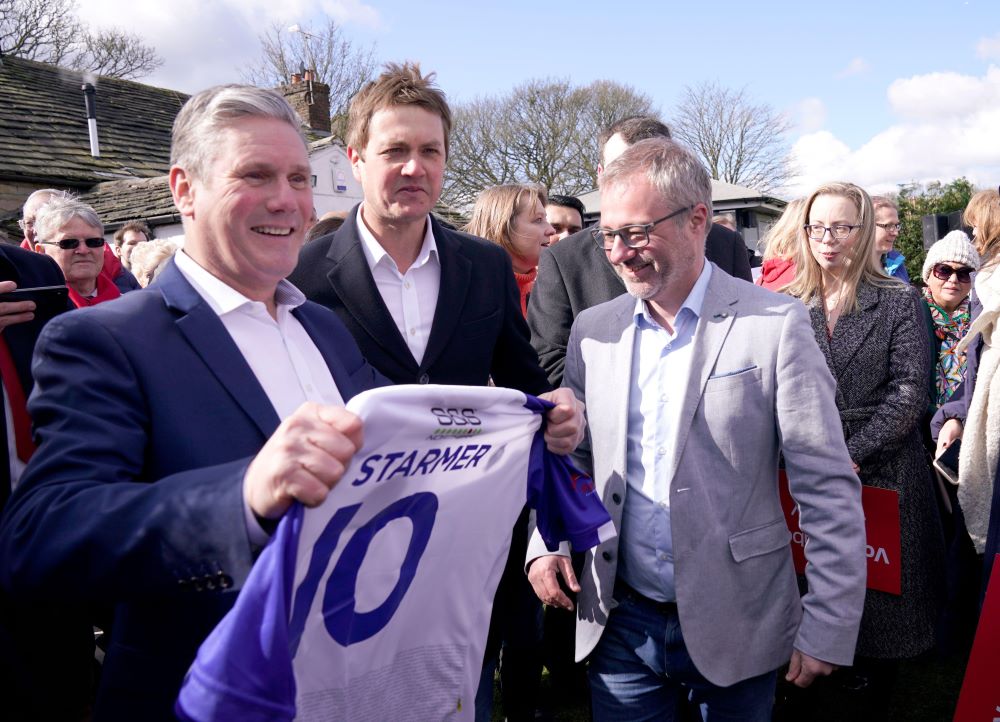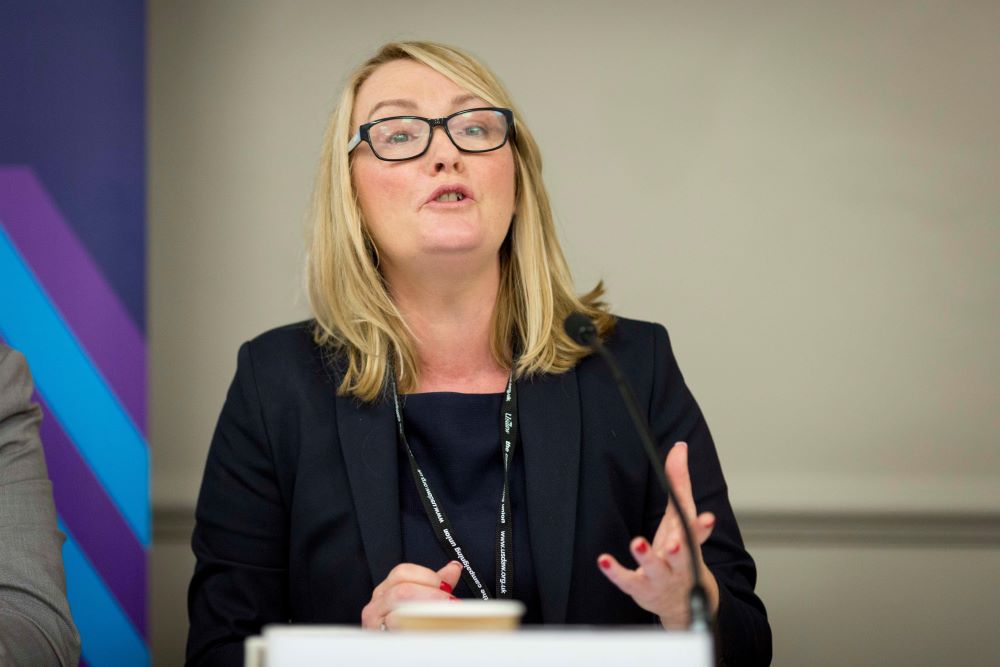Ousted Labour MPs With “Unfinished Business” Are Set On A Return To Parliament
Former Stoke-on-Trent Central MP Gareth Snell at the general election count in 2019
6 min read
Labour is predicted to make significant gains at the next general election and a number of the party’s former MPs who stood down or lost seats in recent years are seizing the opportunity to resurrect their parliamentary careers.
“It’s just unfinished business, having had two short years,” said Jo Platt, who took Andy Burnham’s old seat of Leigh in 2017, only to swiftly lose it again in Labour’s electoral hammering of 2019.
The Conservative party’s landslide victory at the last election, which cost Labour 60 seats, was accelerated by Boris Johnson’s determined mantra to “get Brexit done”, leaving little appetite for the opposition’s uncertain position on the issue. Former leader Jeremy Corbyn is also believed to have alienated a significant number of traditional Labour voters who for the first time turned Tory.
“There were so many things that you wanted to talk about, that we wanted to tackle, but the time that we had in Parliament, Brexit dominated in lots of lots of ways,” Platt said.
“You weren't getting past the issue of the day which was Brexit, and for me it was really frustrating.”
With Brexit’s topline issues largely resolved, new leaders in place, and the Conservatives’ spectacular self-destruction of 2022 having boosted Labour’s ratings, the next election, which must be called before the end of 2024, is likely to be a very different story.
Several notable party veterans have already confirmed they will contest seats for Labour. As well as Platt, former Transport and Scotland Secretary, Douglas Alexander, who was ousted from Paisley South in 2015 after eighteen years, has been selected in East Lothian – a key Scottish target seat. Former shadow health secretary Heidi Alexander, who quit her Lewisham East in 2018 to work for London mayor Sadiq Khan will stand in her hometown of South Swindon. 2019 casualties hoping to win back their seats include former shadow housing minister Melanie Onn who took Great Grimsby in 2015, James Frith who won Bury North in 2017 and former Stoke on Trent Central MP Gareth Snell, also elected in 2017.
 Former Bury North MP James Frith with Keir Starmer at the party's local elections launch in 2022 (Alamy)
Former Bury North MP James Frith with Keir Starmer at the party's local elections launch in 2022 (Alamy)
Like Platt, Frith laments his brief tenure having been “interrupted by a snap election” in 2019, when he lost the Greater Manchester seat to Conservative James Daly by just 105 votes. He is now keen to return to SW1 to finish what he began.
“The same tide that took me in, took me out,” he explained. “I feel there's still a huge amount for me to offer and for me to get done in the constituency that remains my home.
“It remains the place that I'm seeking to represent in parliament for greater length for a greater period of time, with greater impact.”
A Labour campaign source told PoliticsHome that former MPs have a "crucial" role to play ahead of the next election, with their knowledge of their constituency patches and the need for "leaders" who will "champion" their areas.
“Once upon a time, candidates were seen by campaigns (and some leaders) as legal necessities. Nowadays the candidates have a much more crucial and central role to play,” they explained.
“They must be leaders in the seats where they’re standing who will champion their constituents in Parliament.”
They said that it is "not unusual" for people to re-run, or for those who are unsuccessful to have another go.
"Clearly those who have been candidates or MPs in the past will have a wealth of experience to bring. Both in terms of campaigning and, for many, experience of how parliament works." they added.
 Jo Platt, speaking at Labour Party conference in 2019 (Alamy)
Jo Platt, speaking at Labour Party conference in 2019 (Alamy)
Despite recent boosts in polling, Labour candidates know they’ve got their work cut out on the doorstep come the next election. Following 2019’s catastrophic defeat the Labour Together group, made up of activists and MPs including former leader Ed Miliband, launched a review examining what went wrong and how to fix it.
According to The Guardian, which obtained a copy of the report, the party admitted it had a “mountain to climb” if it wanted to get back into power, and had approached 2019 “without a clear strategy of which voters we needed to persuade or how”. It argued that Labour’s electoral coalition was “broken” and that they were “rejected” by their core voters.
“We were selling things at the time that people were not willing to buy,” Snell told PoliticsHome, reflecting on his own loss in Stoke.
“I knocked on doors in 2017 both in my constituency and in neighbouring constituencies and again in 2019, and people just were not willing to give us a listen.
“They had made up their mind that we were not the party for them and that they weren't going to vote for us.”
The latest voter intention polling from YouGov shows that 46 per cent of people support Labour vs 26 per cent for the Conservatives, a proportion which has remained consistent since last summer, despite a slight Tory boost recently thanks to a series of successes by Rishi Sunak’s government. Traditional Labour supporters who voted Conservative for the first time in 2019 appear to be trickling back to Labour, according to Redfield and Wilton, and earlier this month Opinium found Tory support to be at 29 per cent vs 44 per cent for Labour.
But Labour remains sharply aware of recent ground gained by the Conservatives, and the fact that Starmer would need a swing larger than David Cameron achieved in 2010 to deliver the gains needed to become the largest party in the Commons at the next election, even by one seat.
“We’re on our way”, Frith said, but admitted “the deal is not sealed”.
“I think the party knows that, I think Keir knows that. There’s certainly no room for complacency.”
Frith believed that voters needed "assurance as much as they need inspiration," and that while they are “hungry for change”, they need to be certain the party is able to deliver it.
“I think where we're at now is that assurance is plentiful,” he continued.
“What we're now beginning to see is an appreciation, I think, within the party's leadership that you need a proposition – a kind of future offer – not just an opposition.”
Snell agreed that a more proactive approach to sell the party on its own merits was essential to delivering a victory in 2024.
“We cannot wait for the Conservatives to screw up,” he said.
The candidates who spoke to PoliticsHome have remained in the communities they represented, and hope to win back, since they lost their seats, working and knocking on doors as active Labour campaigners.
“There's an LL Cool J song Mama Said Knock You Out, and it starts with the lyric: ‘Don't call it a comeback, I've been here for years’,” Frith said.
“That's the sentiment I ascribe to.”
